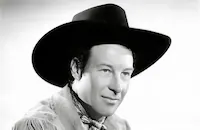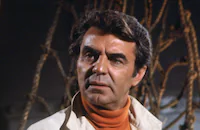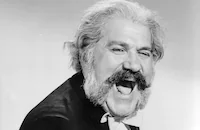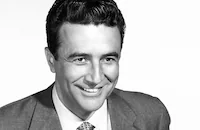Dial Red O
Brief Synopsis
Cast & Crew
Daniel B. Ullman
Bill Elliott
Helene Stanley
Keith Larsen
Paul Picerni
Jack Kruschen
Film Details
Technical Specs

Synopsis
One afternoon, veteran Ralph Wyatt escapes from the Veteran's Administration Hospital psychiatric ward in Brentwood, California, where he is being held for observation, and administrator Maj. Sutter notifies the Hollywood Sheriff's station. The case is assigned to the sympathetic Lt. Andy Flynn, who has dealt with enough disturbed veterans to realize what combat can do to a man's psyche. Suspecting that Ralph will visit his estranged wife Connie, Flynn goes to her apartment, and narrowly misses Ralph, who had left after discovering that Connie was not home. Flynn talks with Connie's neighbor, writer Lloyd Lavalle, who describes Connie as a "party girl." Upon returning to the station, Flynn learns that Ralph is a highly decorated Marine who served in both World War II and Korea, and that he was sent to the hospital after being arrested in a bar fight. Ralph, who has been separated from Connie for over a year, received the final divorce papers from her that morning, and Flynn wonders if that is what prompted him to escape. Although Ralph has been diagnosed with only anxiety neurosis, Flynn muses that someone as well-trained for combat as he could still be driven to violence if the circumstances were right. Meanwhile, Connie meets with her lover, successful real estate agent Norman Roper, at a bar and gets drunk. Back at the station, Flynn sends deputy sheriff Gloria and Sgt. Tony Colombo undercover to comb the Sunset Strip bars to find Connie before Ralph does. While Gloria and Tony are out searching, Roper escorts Connie to her apartment, where she tells him that she is now divorced. Roper, who is married with a child, replies that he will not marry her, and she spitefully informs him that she is pregnant. Enraged by Connie's threat to make their affair public, Roper beats her to death, then wipes his fingerprints from the living room before leaving. Ralph again comes to the apartment building but receives no answer when he knocks at Connie's door, after which Lavalle introduces himself and warns Ralph that the sheriff's department is looking for him. Ralph, who had already called Sutter to tell him that he would be returning to the hospital that night, reveals to Lavalle that all he had wanted was to talk to Connie. Ralph then wanders over to Roper's office, where Roper has been calling clients in order to establish an alibi, to talk with him, as the two men had served together in the same Marine platoon during World War II. Claiming that he has not talked with her in a long time, Roper disavows knowledge of Connie's current circumstances, even when Ralph wonders how she could afford to live in such an elegant apartment building. Ralph confides that he escaped from the hospital, and after he departs, Roper makes an anonymous phone call to the sheriff's station to report Connie's murder. As Roper had hoped, Ralph is immediately suspected of the crime, especially when the coroner determines that Connie was killed by several judo chops to the neck, and Flynn realizes that Marines are taught judo. Soon after, Ralph goes to a bar being staked out by Gloria, and she alerts Flynn, who arrests him. Ralph maintains his innocence, and later that night, when a reporter badgers Deputy Clark for information about the suspect, Ralph learns how Connie was killed. Realizing that Roper, a fellow Marine, must have murdered Connie, Ralph manages to escape from his cell and steal Clark's gun. Flynn is called in and learns not only that Ralph was disturbed by the method of Connie's death, but that Connie was pregnant and fingerprints other than hers were found in her bedroom. Flynn then deduces that Roper is the true killer and immediately races to his house. Roper, who had been notified of Ralph's escape, lies in wait for his former friend and the two engage in a shootout. Flynn fights with Ralph and gets his weapon, however, and assures him that he believes in his innocence. Roper is apprehended, and later, his guilt is confirmed when a bartender who often saw him with Connie identifies him. Clark and the other policemen then wish Ralph good luck, and Flynn takes him out for a well-earned breakfast.

Director
Daniel B. Ullman
Cast

Bill Elliott
Helene Stanley

Keith Larsen

Paul Picerni

Jack Kruschen

Elaine Riley
Robert Bice

Rick Vallin
George Eldredge
John Phillips
Regina Gleason
Rankin Mansfield
Mort Mills
William J. Tannen
Scott Lee

Gregg Barton

Sam Peckinpah
Mike Ragan
John Hart
Forrest Lewis
Leighton Noble
Lee Roberts
Walter Conrad
Larry Blake
Sydney Mason
Crew
William Austin
Ralph Butler
Mary Chaffee
Vincent M. Fennelly
Ellsworth Fredricks
Sam Gordon
Bert Henrikson
Joseph Kish
Paul Malcolm
Sgt. Hal Marlowe
Ray Mercer
David Milton
Edward Morey Jr.
Sam Peckinpah
Sgt. Virgil Piper
Milt Rice
Shorty Rogers
Lester A. Sansom
Charles Schelling
Marlin Skiles
Mary Smith
Daniel B. Ullman
James West
Al Westen
Allen K. Wood

Film Details
Technical Specs

Quotes
Trivia
Notes
The working titles of this film were Code 3 and Dial 116. The opening credits are superimposed over a shot of a page from a Los Angeles phone book, with instructions to "Dial Red O" in order to make an emergency call. Daniel B. Ullman's onscreen credit reads: "Written and Directed by Daniel B. Ullman." Sam Peckinpah (1925-1984) who worked as the picture's dialogue director, also had a small role in the film, playing a cook. Dial Red O was the director-screenwriter's first feature film acting role. He appeared onscreen periodically thoughout his career, either as Sam or David or David Samuel Peckinpah.
Dial Red O was the first of a series of five films starring Bill Elliott as a police lieutenant. Although Elliott's character was called "Lt. Andy Flynn" in the first film, he was called "Lt. Andy Doyle" in the subsequent pictures. Several of the films featured Don Haggerty as Doyle's partner, "Sgt. Mike Duncan." Four of the five films were produced by Ben Schwalb, and all of the pictures were produced and released by Allied Artists. The last of the "Lt. Andy Doyle" pictures, Footsteps in the Night, was released in March 1957.












